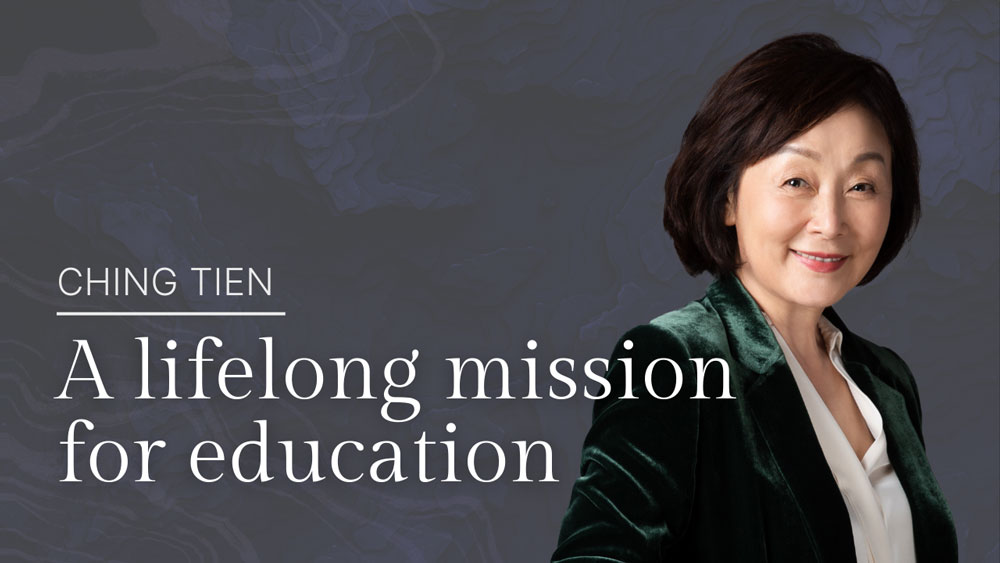David Lovejoy
3
min read
Empowering Girls
Ching Tien
Founder & President | Educating Girls of Rural China (EGRC)
Key Highlights
Against all odds, Ching Tien overcame personal hardship and societal prejudice in her youth, only to return to rural China with a mission to transform lives through education.
Inspired by the compelling stories of girls in rural China, Ching founded EGRC to provide educational opportunities, creating powerful ripple effects within their communities and beyond.
From an 'extra' girl fearing displacement to a Ph.D. graduate: witness the transformative power of education and resilience through Ching's impact on these young lives.
Introduction
In the face of adversity, some individuals rise, driven by an inspiring and transformative determination. One such individual, Ching Tien, has dedicated her life to empowering girls in rural China. Her journey, marked by personal struggles and societal challenges, is a testament to the power of resilience and the impact of education.
During the Cultural Revolution, Ching's father was imprisoned when she was just six years old, leaving her to navigate a society where a person's value was often determined by their family background. This reality was particularly harsh for Ching, who was constantly afraid of questions about her past or her family. She was relocated far from her prestigious school and hometown of bustling Beijing to a rural province to work in a factory for several years.
"I grew up without a father," Ching recalls. "Every door I knocked on was closed. Getting out from Gansu back to Beijing was a huge struggle. It was almost impossible. I almost gave up."
Despite these challenges, Ching managed to leave Gansu and return to Beijing, a feat she likens to finding a needle in a haystack. However, the struggle didn't end there. She felt trapped in a society that didn't value her as an individual, and she yearned for a place where she could live less stifled.
That place turned out to be Canada. Despite the language barrier and the challenges of being a single mother raising two children, Ching found a sense of belonging and respect in her new home. She ran a successful art gallery, which provided for her family and nurtured her adventurous spirit, a trait she believes she inherited from her grandfather.
Returning to China
Ching's journey took a dramatic turn when she decided to return to China to address a deep-rooted issue: the lack of educational opportunities for girls in rural areas. She was particularly moved by the stories of girls who, like her, faced societal pressures and discrimination simply because of their gender. One such story was of a girl who was given away at birth to another family in a different province. When this girl turned 15, her adoptive mother told her she could no longer attend school because she was a girl. Undeterred, the girl ran away, found her birth parents, and expressed her desire to continue her education. With the help of the woman's organization, this girl could complete high school and attend a vocational training school. Today, she works in a bank, a far cry from the fate that awaited her otherwise.
Ching founded Educating Girls of Rural China (EGRC), an organization dedicated to providing scholarships for girls in rural China. Through EGRC, she has been able to help many girls overcome societal barriers and pursue their dreams. "I feel people should become themselves," Ching says. "Education is the key to that. It's not just about poverty or hardship. It's about resilience, determination, and the power of education to change lives."
"These stories are too many," Ching says. "Every girl has a story. We have another girl in Vancouver attending a conference; she just finished her Ph.D. in electronic engineering at the University of Manitoba. And just two days ago, we were chatting, and she said, ‘When I grew up, I always felt I was extra. And I was always a little bit, you know, afraid my parents would give me away.’"
Conclusion
Ching's journey from a girl in Gansu to a woman making a difference in rural China is a powerful reminder of the potential within each of us. It's a story of resilience, overcoming adversity, and the power of education to transform lives. In the words of Malala Yousafzai, a Pakistani activist for female education and the youngest Nobel Prize laureate, "One child, one teacher, one book, one pen can change the world." Ching's work embodies this sentiment, proving that with the proper support and opportunities, girls can change their lives and contribute to improving their communities and the world.



